As Thanksgiving rolls around, your dog is probably starting to get very excited by all of the smells filling your home. Those eager eyes deserve a tasty treat, but are the human foods you're cooking going to be safe for them?
This article covers some of the best human foods for dogs, and some of them are Thanksgiving classics.
Need to stock up on your pet's favorites? Shop our 40% off Black Friday sale right now! 40% off orders over $100, and 30% off orders under $100. Discounts apply automatically at checkout.
Shop the SaleWhen it comes to giving your dog a special treat, there are plenty of human foods for dogs that can put a smile on their face. Several human food options even provide a nutrition boost to the menu.
The following human foods are safe for dogs:
- 1. Eggs
- 2. Peanut Butter
- 3. Lean Meats and Fish
- 4. Carrots
- 5. Blueberries
- 6. Sweet Potatoes
- 7. Yogurt
- 8. Pumpkin
- 9. Peas
- " href="#img-src-cdn-shopify-com-s-files-1-0030-7435-9366-files-p5-min_grande_b0a8088f-a936-4efb-9159-7fa49edf83c2_large-jpg-v-1591081658-alt-green-peas-style-font-size-15px-float-none">
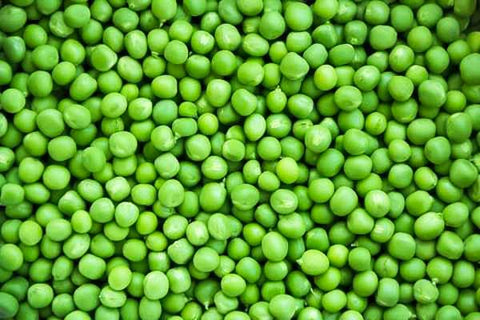
- 10. Rice
- " href="#img-src-cdn-shopify-com-s-files-1-0030-7435-9366-files-p6-min_grande_e3fb240e-4f6c-4b0d-b8ee-14a7c32b8d29_large-jpg-v-1591081692-alt-woman-sitting-on-a-bench-giving-her-brown-dog-a-treat-for-sitting-down-style-font-size-15px-float-none">
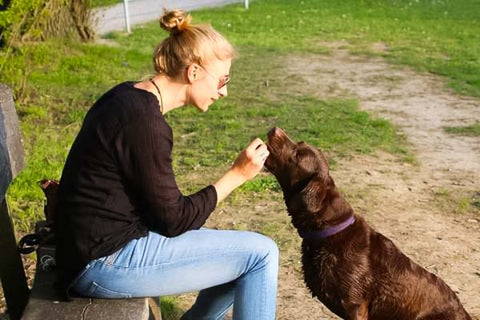
1. Eggs
Eggs are an excellent source of highly digestible protein that even the most finicky canines find absolutely delish! Because they are designed with everything a growing chick needs to develop, they have a complete amino acid profile and are a true protein superfood.
Eggs are also rich in vitamin A, vitamin B12, riboflavin, iron, selenium, and fatty acids. They are, however, relatively high in cholesterol so it is important to feed them in moderation – no more than 2-3 eggs per week.
It is best to cook eggs before serving them. If you buy organic eggs, you can also grind up the shells from hard-boiled eggs and add them to the dinner bowl for a boost of calcium to support healthy bones and teeth.
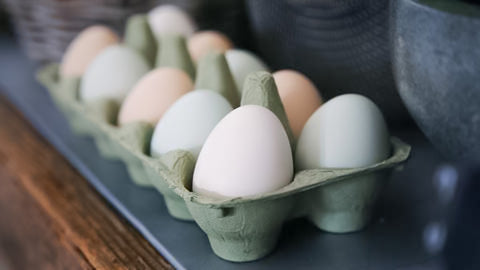
2. Peanut Butter
Peanut butter is a fantastic addition to your dog’s diet as long as you keep in mind that it is rich in both fat and calories and should be used only as a treat. It also contains lots of protein, niacin, and vitamins B and E.
To pick out the best peanut butter for your pup, consider going for unsalted or “natural” style peanut butter to avoid the additions (like sodium and sugars) that make some brands taste so good to people.
IMPORTANT: Never buy “diet” or “sugar-free” versions of peanut butter for your dog. The artificial sweetener Xylitol, sometimes used in peanut butter, is highly toxic and potentially deadly to dogs. Always check the label!
3. Lean Meats and Fish
Lean meats and fish are one of the healthiest human foods for dogs. Stick to simple preparation methods and avoid spices, salt, and the addition of extra fat during the cooking process. Poaching, steaming and broiling are all excellent cooking methods.
Cartilage and connective tissue found in meat are both excellent supplements, particularly for bone and joint support for senior dogs. However, avoid feeding any bones as they are brittle when cooked and can present serious risks of choking and damage to the digestive tract.
4. Carrots
Low in calories and rich in dietary fiber, carrots are a healthy snack for dogs. Packed with vitamin A, carrots boost eye, skin, and coat health to support a healthy immune system.
You can feed them raw or cooked. In fact, a whole carrot is a great alternative to rawhide and can help keep teeth clean during a nice long (supervised) chew.
Fun Tip: Frozen chopped carrots make a nice cooling treat for dogs to enjoy on a hot summer day!
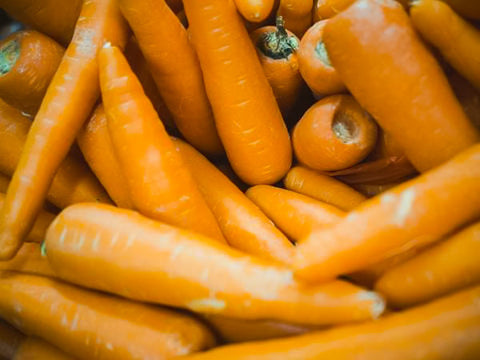
5. Blueberries
Considered one of nature’s superfoods, blueberries are perfectly safe for our furry friends. In addition to having high amounts of vitamin C, blueberries are an excellent source of antioxidants that provide long-term immune system support against “free radicals,” compounds that hasten aging at the cellular level.
Blueberries are just the right size to use as a reward during a training session. You might be surprised how enthusiastic your pooch will be to learn that new trick with these tasty, bite-sized, natural treats offered as a reward!
6. Sweet Potatoes
Sweet potatoes aren’t just for Thanksgiving dinner! They make an excellent and inexpensive supplement to your dog’s diet. They offer plenty of natural fiber and are a low-glycemic source of carbohydrates.
These are also nutrient-dense with lots of vitamins A, B6, and C, as well as plenty of potassium, calcium, and iron. They are, however, relatively high in calories so be sure to keep them in moderation for pudgy pups.
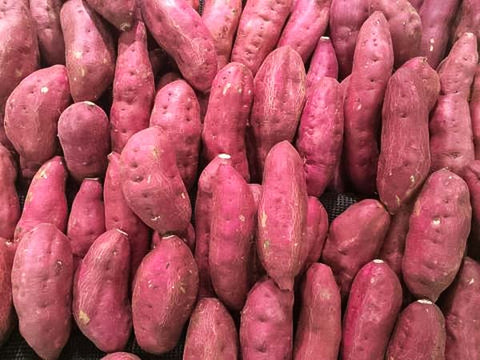
7. Yogurt
In general, dairy products can be difficult for some dogs to digest because they contain lactose which some canines lack the enzymes to digest. Dogs can be lactose intolerant just like humans can be. However, because yogurt is fermented, it is full of probiotics that can be very beneficial for the digestive system, even for dogs.
Try adding very small amounts to your pooch’s regular meals to get your dog’s immunity up, starting with a single tablespoon. As long as she tolerates it well, a few tablespoons of plain nonfat yogurt can be added as a daily supplement to her meals. Just avoid all flavored varieties which have added sugars. And, artificial sweeteners are definitely on the list of things dogs can't eat.
8. Pumpkin
Pumpkin is a nutrient and fiber-dense food that can be an effective treatment for mild diarrhea in dogs. It is one of those human foods for dogs that are packed with nutrients, too. It is particularly rich in vitamins A, C, and E as well as potassium and beta carotene.
It is important to limit the amount of pumpkin you feed to 1-3 tablespoons at a time, depending on the size of your furry friend. Also, be sure to use either steamed or roasted pumpkin or plain canned pumpkin. Do not use any prepared pumpkin that has been spiced in advance (nutmeg, in particular, is a toxin for dogs).
9. Peas
Like blueberries, peas are perfectly sized for a handy and healthy training treat, a fantastic alternative to many processed treats full of healthy fats and preservatives.
Feed them fresh or frozen to give your canine great sources of thiamin, potassium, and phosphorous. Avoid canned peas which are often full of sodium.
10. Rice
Although it is not very nutrient dense, cooked rice is a bland food you can safely feed your dog when they have a sensitive stomach or diarrhea. Of course, it is important to check with your vet if your dog has either symptom to make sure it is not a sign of something else that might need medical attention.
To make rice more palatable, consider cooking it in low sodium chicken broth or mixing in a bit of chicken breast.
Here at Lolahemp, we are dedicated to helping pet owners find natural ways to improve their pet’s health and quality of life. That includes giving you helpful information about the right people food for dogs that can actually add value to your pup's diet!
References:
https://www.ncbi.nlm.nih.gov/pmc/articles/PMC3249911/
https://pets.webmd.com/dogs/can-dogs-eat-eggs
https://www.akc.org/expert-advice/nutrition/can-dogs-eat-peanut-butter/
https://www.dogster.com/dog-food/why-you-should-use-lean-meats-in-fresh-food-dog-diets
https://dogblog.com/can-dogs-eat-green-peas/



